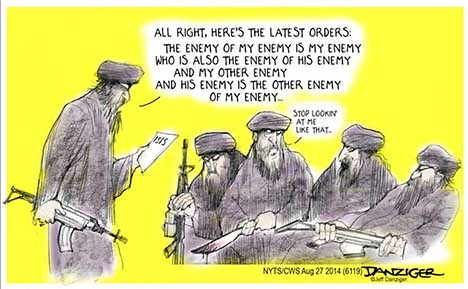
One political cartoon sums up the problem with both ISIS and the current crisis in Yemen…

One political cartoon sums up the problem with both ISIS and the current crisis in Yemen…

by Kathryn Zyskowski, Cultural Anthropology
Click here to read the five articles and interviews with the authors.
This collection gathers together five articles previously published in Cultural Anthropology, by Naveeda Khan, Hayder Al-Mohammad, Carolyn Rouse and Janet Hoskins, Kenneth George, and Arzoo Osanloo. The collection also includes interviews with the authors, who reflect on their work, as well a commentary on the whole collection from Charles Hirschkind. The articles engage with everyday aspects of living, negotiating, and constructing the world among contemporary Muslims. Moving beyond a focus on the aesthetics of dress, gender relations, or the text in Islam, the collection crosses national boundaries and thematic areas, touching on the immense diversity of nations, peoples, languages, and ideas that fall under the category of Islam. A broad array of ethnographic material is included in the collection: gathering to eat soul food in Los Angeles, navigating a kidnapping in post-invasion Iraq, a child’s relationship to a jinn (spirit/ghost) during sectarian violence in Karachi, discourses around justice in media and conversation surrounding a young man’s death sentence in Iran, and debates about the production of Islamic art in Indonesia.
Continue reading Everyday Islam

MessyNessy has put a page about the Marsh Arabs with some fabulous pictures. Check it out here.
It was Iraq’s ‘Garden of Eden’; unique wetlands in southern Iraq where a people known as the Ma’dan, or ‘Arabs of the marsh’, lived in a Mesopotamian Venice, characterised by beautifully elaborate floating houses made entirely of reeds harvested from the open water.
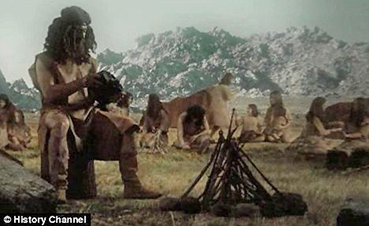
[Webshaykh’s Note: This study is perhaps a bit dated and overstretched, but it can help explain why Iraq and Syria still matter (well, sort of…). I sort of doubt all the handsome men were farmers back then… or could it be that handsome Turks turned the eyes of lassies in Ireland independent of their farming expertise?]
Most Britons descended from male farmers who left Iraq and Syria 10,000 years ago (and were seduced by the local hunter-gatherer women)
By David Derbyshire for MailOnlineUpdated: 13:37 GMT, 20 January 2010
Most Britons are direct descendants of farmers who left modern day Iraq and Syria 10,000 years ago, a new study has shown.
After studying the DNA of more than 2,000 men, researchers say they have compelling evidence that four out of five white Europeans can trace their roots to the Near East.
The discovery is shedding light on one of the most important periods of human history – the time when our ancient ancestors abandoned hunting and began to domesticate animals. Continue reading Those Levantine British Libertines…

Risk goes Mideast
The more the media spreads news about ISIS or ISIL or IS or Da’ish, the crazier it gets. The current Wikipedia entry is one of the longest I have ever seen. But let’s take a reality check here. ISIS is a digital creation as much as a successful terrorist operation that feeds the current media frenzy with Islam and terrorism. If social media precipitated, or at least facilitated, the Jasmine Revolution that blossomed into a wider Arab Spring, then cyberspace is the spontaneous generator of ISIS. This is no homegrown group, despite the caliphal self appointment of Abu Bakr al-Baghdadi (remember “whose your daddy?”) It has been hugely successful in recruiting, with estimates as high as 31,500 fighters according to the CIA over a month ago.
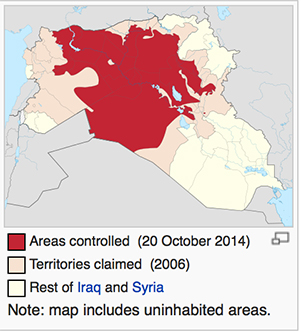
Wikipedia’s red scare
I am not sure who took the census, nor if anyone was counting the disaffected white guys who crossed the Turkish border over the past several months, but this is a rather large number for a ragtag wannabe caliphate. It is a bit of a mystery how this number, incredible as it is, has been so successful against the Iraqi army, said to have 271,500 active personnel and 528,500 reserve, or Syria with 250,000 active personnel in its army. If this were a RISK game, I would say that both Iraq and Syria are not into gambling as much as ISIS is. Remember those games when your nerdy friend put all his troops in Kamchatka and conquered all of Asia only to lose everything before his next turn when everyone else ganged up on him. If only this was a Risk game.
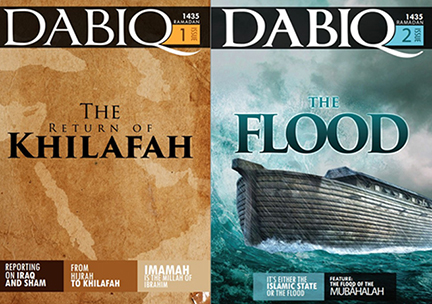
ISIS has a glossy side
I am fully aware of the horror of ISIS. If you read Revelation and like Armageddon scenarios, these guys are the Beast, the Antichrist and even the Whore of Babylon rolled into one. And why not throw in that stealth Mohammedan Barack Hussein Obama. Continue reading ISIS at RISK
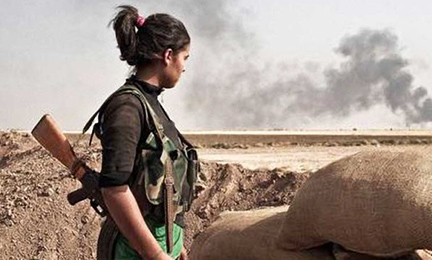
by Ibrahim Kalin, Daily Sabah, October 26, 2014
So it looks like Mosul, the second largest city in Iraq, is not as strategic as Kobani. Nor is Aleppo while the Bashar Assad regime kills hundreds of civilians there. It is not only Mosul or Aleppo though that are forsaken in this supposedly smart strategy. About one third of Iraq and Syria are under Islamic State of Iraq and al-Sham (ISIS) control and have been given up in the rush to liberate the now legendary town of Kobani – a town whose name until a few weeks ago no one had even heard of but has suddenly become the frontline in the fight against ISIS.
In the meantime, Aleppo in Syria, a city of more than 3 million, is about to fall to the Assad regime. While the world’s attention has been focused on Kobani, Mr. Assad is virtually carrying out a massacre with barrel bombs and artillery in Aleppo, Homs and other cities. Will arms be airdropped to Aleppo as well? And if not, why? One cannot help but ask: how is it that Kobani has suddenly gained such “strategic significance” with global attention when U.S. Secretary of State John Kerry said just two weeks ago that preventing Kobani from falling to ISIS is not a strategic priority for the U.S.? How has Kobani become the center stage in the fight against ISIS while the fact that one third of Iraq and Syria is under ISIS control is not even being discussed? Continue reading AFTER KOBANI
The following commentary is about the famous Arabic language cookbook of Naziha Adibe, published half a century ago in Baghdad and known throughout the Arab world.

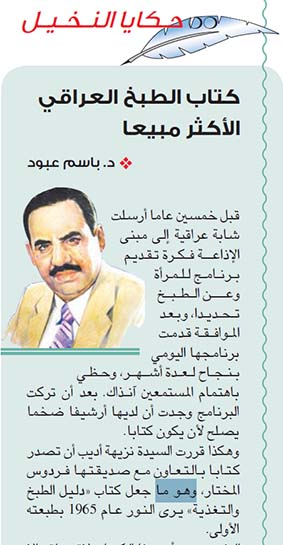
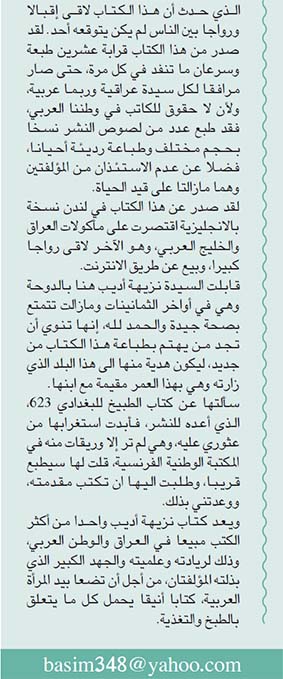

By Timothy Daniels, Guest Contributor, New Mandala, October 6, 2014
There appears to be no end to the war between several western powers—leaders in the global capitalist world order—and Muslim militants. Both sides are spiralling into some form of mutually assured destruction. Fragile “modern†nation-states, formed under the influence of European colonial forces in the early twentieth century, are crumbling and revealing their inability to deliver the promised fruits of secular modernity. Millions of Muslims are being killed, thousands are fleeing for their lives, and centuries old sites of Islamic civilisations are being decimated, while war-stressed western economies are declining into the shadows of China’s great industrial leap forward.
In the face of the current phase of this violent confrontation ushered in by the emergence and establishment of a militant-led Islamic State (IS) in Syria and Iraq, many officials of western governments and Muslim leaders are making public statements that include the positive representation of Islam as a “religion of peace.†Linguistic anthropologists or any other social scientists seeking to provide a serious scholarly analysis of such discourse would examine the context and what the speakers are trying to do. Here, some of the social meanings of these statements may include efforts to reinforce the peace-loving posture of the majority of Muslims and to calm the fears of non-Muslims, many of whom have already begun to resort to acts of violence against fellow citizens perceived to be Muslims. However, this scholarly tack is not the approach Clive Kessler chose.
Clive Kessler, a Columbia University trained Emeritus Professor of Sociology and Anthropology at the University of New South Wales, chose to interrogate the truth value of discourse expressing the positive representation of Islam “as a religion of peace.†In the article, “The Islamic State and ‘Religion of Peace,’†published online in the Quadrant on September 26, 2014, Kessler tells us that he finds this description of Islam to be “bland, disingenuous, intellectually lazy, delusional, politically evasive, and altogether simplistic.†He wants us to have a clear idea of what we’re confronted with in order to devise an “effective response.â€
Continue reading Islam, a religion of peace